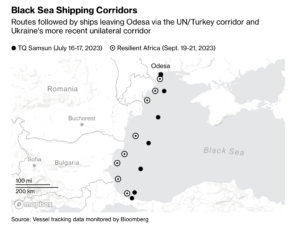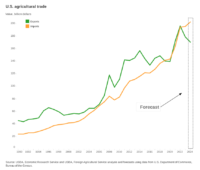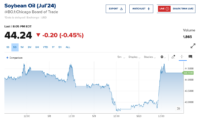Bloomberg's Clarice Couto reported this past Friday that "a surprising tax change in agriculture powerhouse Brazil has the potential to make soy grown in the world’s largest bean exporter less…
Ukraine Reaches Insurance Deal For Black Sea Grain Exports; as Amazon Drought Impacts Crop Shipments
Financial Times writers Ian Smith and Isobel Koshiw reported today that, “Ukraine has reached a deal with global insurers to provide affordable cover to ships carrying grain and other critical food supplies from its Black Sea ports, even as its war with Russia wages on.
“The new public-private partnership was announced on Wednesday by Kyiv and insurance broking giant Marsh McLennan, after talks revealed by the Financial Times in August.
“It will offer up to $50mn each of hull and liability insurance from Lloyd’s of London firms for ships carrying agricultural commodities, providing so-called war risk cover in case of losses coming from the conflict.”
Today the 100th ship departed the Black Sea humanitarian corridor - an export lifeline for Ukraine that has delivered 3.7 million tons of food & goods to the world. pic.twitter.com/rL0Xv1rxQY
— Ambassador Bridget A. Brink (@USAmbKyiv) November 13, 2023
Smith and Koshiw pointed out that, “Since Russia withdrew from a UN-brokered grain deal in July, a limited number of ships have sailed through an alternative corridor along Ukraine’s Black Sea coast under the protection of Ukrainian coastal air defence systems. President Volodymyr Zelenskyy said on Tuesday that 4mn metric tonnes had been exported through that corridor.”
The FT article added that, “Ukraine’s Prime Minister Denys Shmyhal said the insurance facility would allow Kyiv to ‘provide vital food supplies to the world at the same time as supporting the Ukrainian economy and keeping the Black Sea open for international trade.'”
Reuters writer Pavel Polityuk reported yesterday that, “Insurance premiums have risen sharply following a Russian attack on a Liberia-flagged civilian vessel entering port in the Odesa region in early November, killing a Ukrainian pilot and injuring four crew members. It was the first fatal strike involving a commercial ship in many months.”
The article noted that, “Ukrainian transport authorities last week said 91 vessels exported 3.3 million metric tons of agricultural and metal products as of Nov. 9.
“Ukraine’s government expects a harvest of 79 million tons of grain and oilseeds in 2023, with its 2023/24 exportable surplus totalling about 50 million tons.
“Ukrainian grain exports have fallen to 9.8 million metric tons as of Nov. 6 in the 2023/24 July-June marketing season from 14.3 million tons a season earlier.”
And Bloomberg writers Aine Quinn, Volodymyr Verbianyi, and Max Reyes reported yesterday that, “Ukraine is starting an insurance program with broker Marsh McLennan and Lloyd’s of London to provide cover for grain vessels sailing from Ukraine’s deep-sea ports, just days after a ship was hit by a Russian missile.”

“Russia has threatened to treat any ships sailing to Ukraine as potentially carrying weapons. Still, a steady stream of ships has been transporting grain and metals since September,” the Bloomberg article said.
Recall also that Marc Santora reported in Monday’s New York Times that, “Despite having no warships of its own, Ukraine has over the course of the war shifted the balance of power in the naval conflict. Its use of unmanned maritime drones and growing arsenal of long-range anti-ship missiles — along with critical surveillance provided by Western allies and targeted assaults by Ukraine’s Air Force and special operations forces — have allowed Ukraine to blunt the advantages of the vastly more powerful Russian Navy.
‘At this point, the Russian Black Sea Fleet is primarily what naval strategists term ‘a fleet in being’: It represents a potential threat that needs to be vigilantly guarded against, but one that remains in check for now,’ said Scott Savitz, a senior engineer at the RAND Corporation, a federally financed center that conducts research for the United States military.
“‘Remarkably, Ukraine has achieved all this without a substantial fleet of its own.'”
Meanwhile, a separate Reuters article today reported that, “Ukraine’s state railways said on Wednesday it had restricted grain deliveries to Odesa, one of the country’s key Black Sea ports, due to repairs.
“‘Ukrzaliznytsia has started repairing the railway infrastructure on its network, which hinders the movement of freight trains towards the ports of Odesa region,’ Valeriy Tkachov, deputy director of the commercial department at the railways, said on Facebook.”
In other transportation related news, Bloomberg writer Dayanne Sousa reported yesterday that, “A severe drought in the Amazon region is disrupting grain shipments more than anticipated, according to one of Brazil’s top barge operators.
“Unable to move its barges filled with products like corn and soybeans, Hidrovias do Brasil SA is forecasting lower results for this year than previously predicted, company executives said on an earnings call Tuesday.”
Sousa explained that, “The company operates along a route known as the Northern Arc, an array of ports along the Amazon and northeastern Atlantic coast that transport crops from farms in central Brazil. According to the company’s own measurements at one of the rivers in the region, water levels are about 40% lower than they were in the same period last year.”
Elsewhere, Bloomberg writer Aine Quinn reported yesterday that, “Russia’s wheat exports are slowing from their record pace as traders see lower demand from key importers.
“The country’s two bumper harvests have helped bring global prices down from all-time highs after President Vladimir Putin’s invasion of Ukraine, and shippers have been rushing to get those volumes to market. But demand is suffering as major buyers like Egypt and Tunisia struggle with access to hard currency, as well as Moscow’s efforts to control foreign sales at prices it deems too low.”

Quinn added that, “The US Department of Agriculture boosted its Russia 2023-24 wheat production estimate to 90 million tons from 85 million tons last week.”







